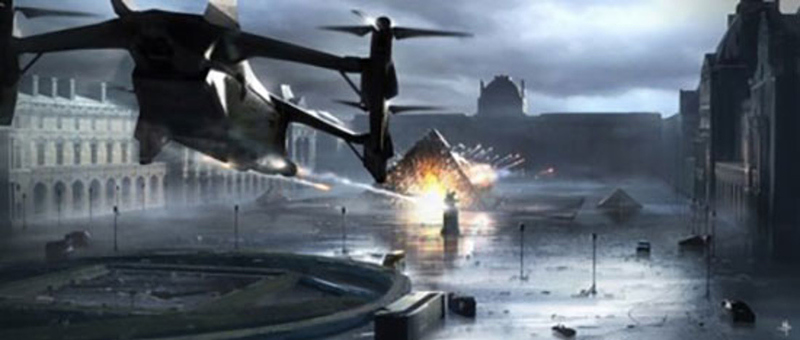As we watch and respond to this new administration’s first days, it seems almost an era ago that our #AvantMuseology symposia took place in Brooklyn and Minneapolis this past November.
With that in mind, we are very pleased to see ongoing thoughts on those generative, energized, and truly inspiring days.
A helicopter aims for I. M. Pei’s pyramid at the Louvre in a scene from Edge of Tomorrow (2014).
At Temporary Art Review, Genevieve Quick reviews the two-city symposium, reflecting on
The expansive conference of thirteen rigorous and engaging presentations [that] considered early Soviet attempts to use museums to craft a “better, more evolved human being” by making them more reflective of all aspects of life, in content and form.
Quick provides thoughtful analyses on speakers and institutions that presented, and others she imagined could have also responded to the themes of the symposium. In concluding thoughts she said the following of our collective roles as artists and institutions:
In the era of post-modernity, we have all come to acknowledge that museums and display are not neutral, which places tremendous and invigorating responsibilities upon our cultural institutions. Though not explicitly stated in the conference’s aims, the presentations suggested many ways that museums can use art to make sense of the world. With the symposium occurring within days of the election, the speakers and attendees were understandably unprepared to approach the prospects of a President-elect Trump. With shock and dread hanging in the atmosphere, now is the time that museums can lead the political and social conversations that are pressing, both both domestically and abroad.
William Harris for Full Stop included the following remarks in his thorough, edifying take on the culminating two days of the Avant Museology symposium at the Walker Art Center:
“The museum of contemporary art might very well be the most advanced recording device ever invented,” the introductory speaker told the crowd at the Walker. The symposium’s opening remarks revolved around museums and their social role, but midway through they sharpened: “What can art contribute to the struggle against nationalism, racism, and fascism?”
As the talks carried on, the election neither vanished nor took center stage. Unlike so much else of the past weeks, it didn’t muddy or embarrass the topic at hand. Instead the study of contemporary art museums and their radical potential acted as an oblique looking glass, refracting the disaster of the day through an odd set of contexts and histories, some long and global in perspective, others slim reminders of Trumpism’s promise to impact things thought marginal and distanced. The mushrooming of global art, saturated by finance capital and saturating the world with gleaming, enormous museums, has already made for a convulsive landscape, one easily caricatured: jet setting elites bouncing from festival to gala, stowing sculptures in foreign tax havens and presiding over the privatization of an art world that has come to stand for the corruptions of globalization. Amid this display of transnational excess, what will this latest shock entail? How will art museums respond to Trump’s tetrad of money, populism, racism, and spectacle?
João Enxuto and Erica Love continued on from their live coverage of the symposia on this platform, in the form of a text on the Walker Art Center’s blog that bridges Avant Museology and ArtStrike.
They ask, “What will the relationship between art museums and their publics look like following recent global events like Brexit and the US elections?” Read their full essay here.
May the discussions and actions continue on heartily in the coming months and years.
